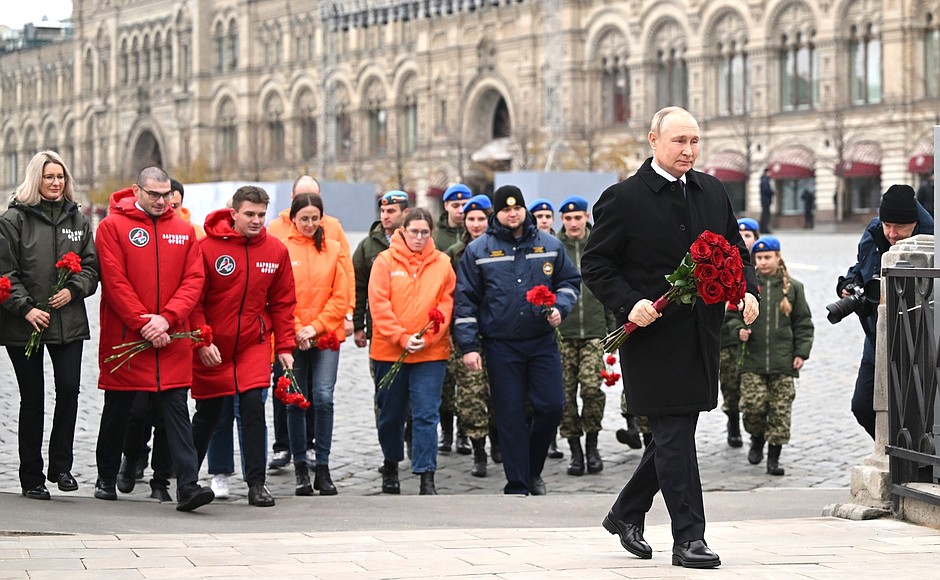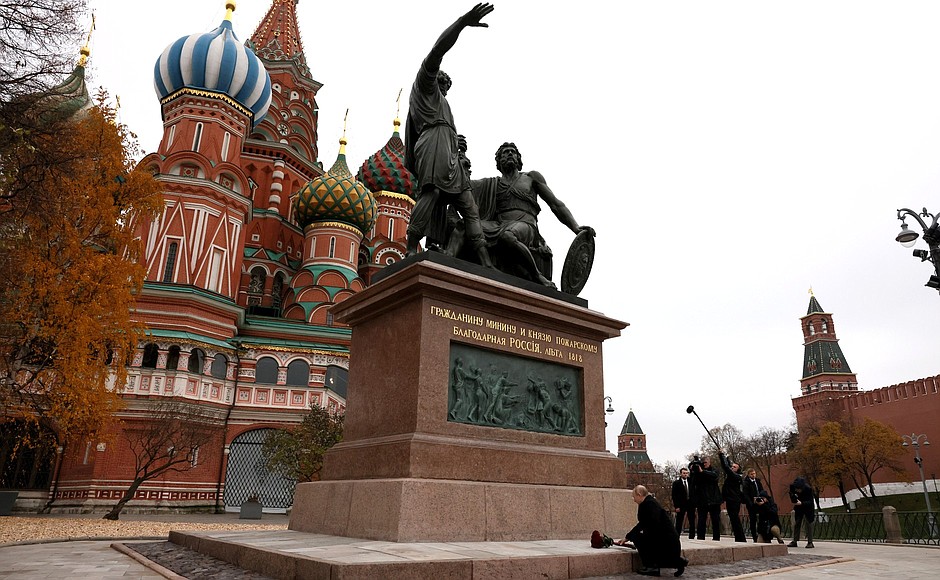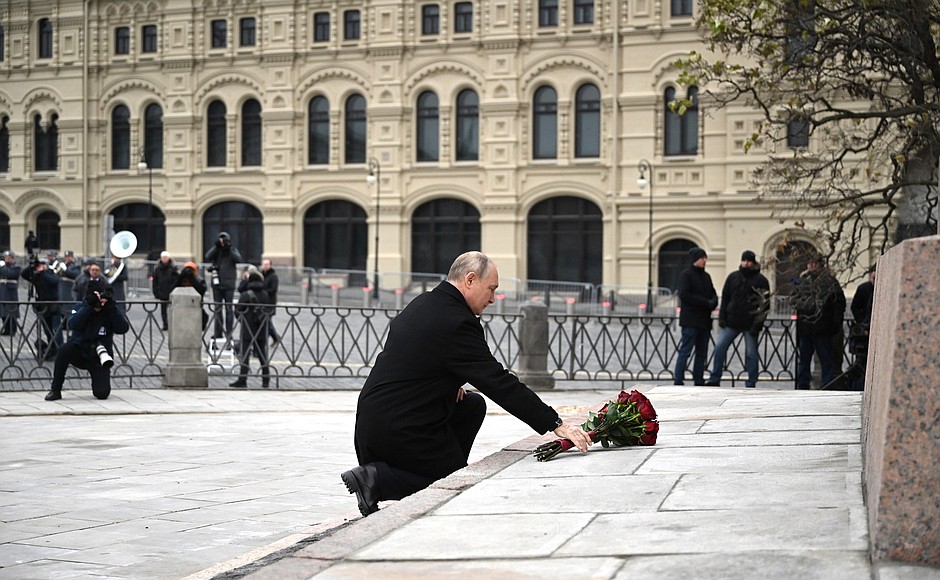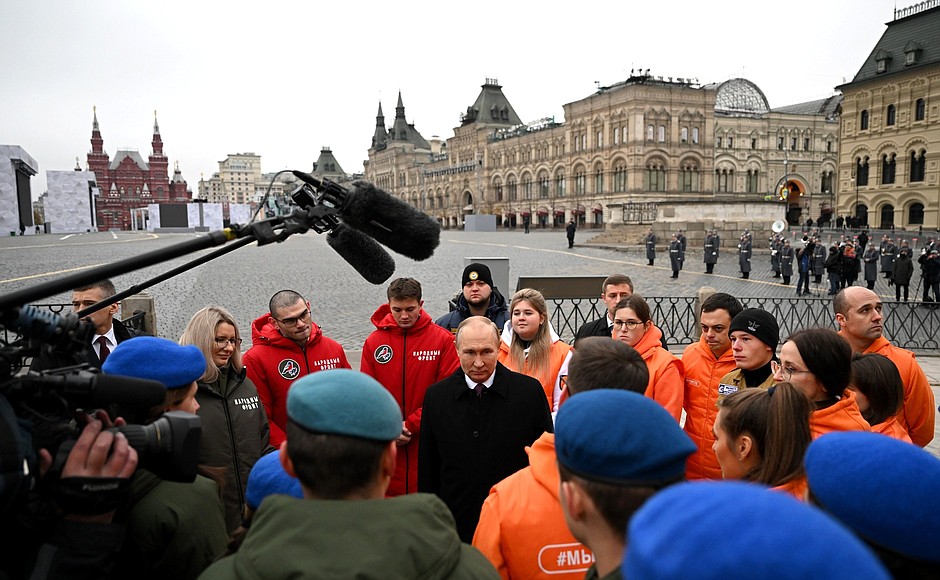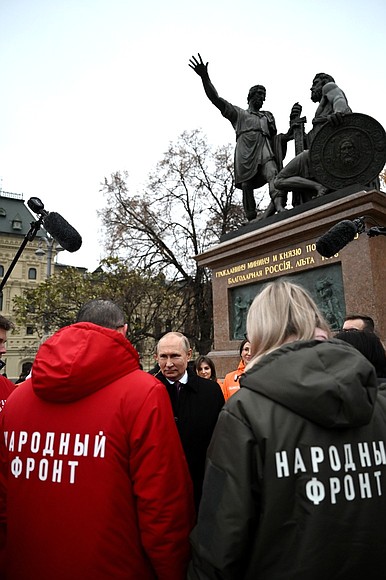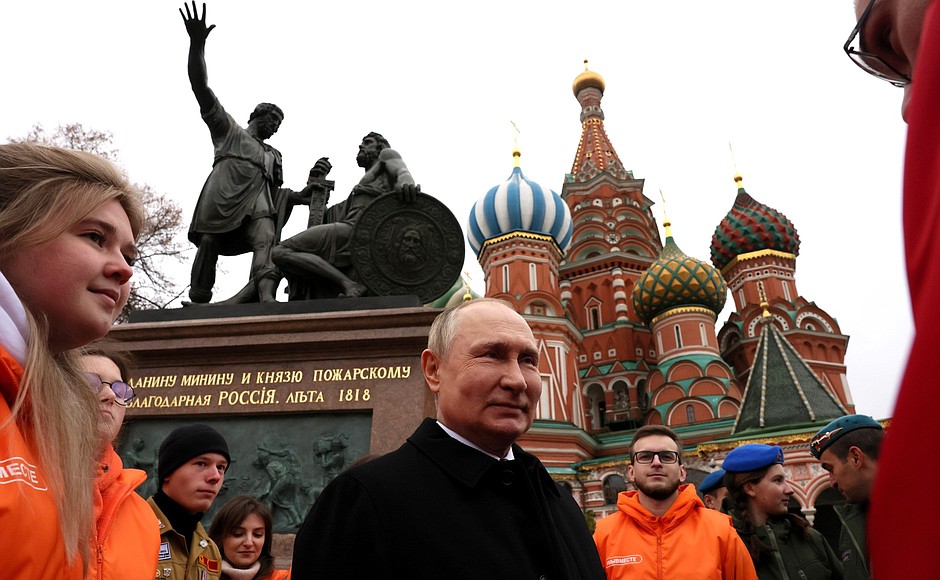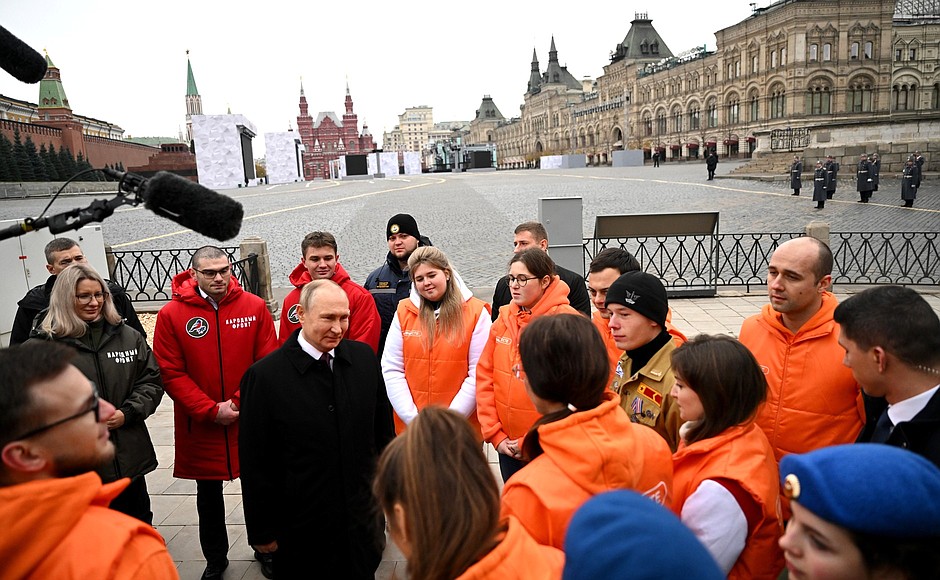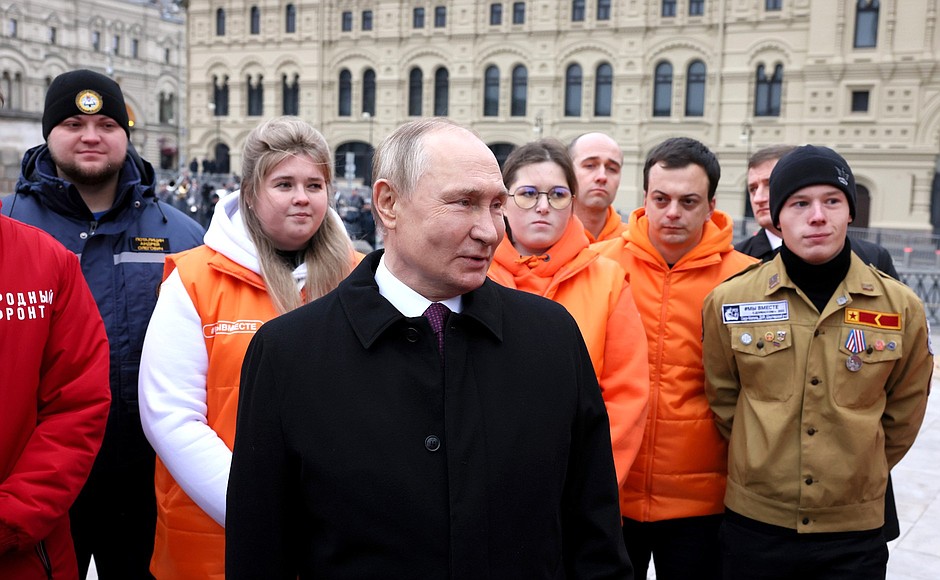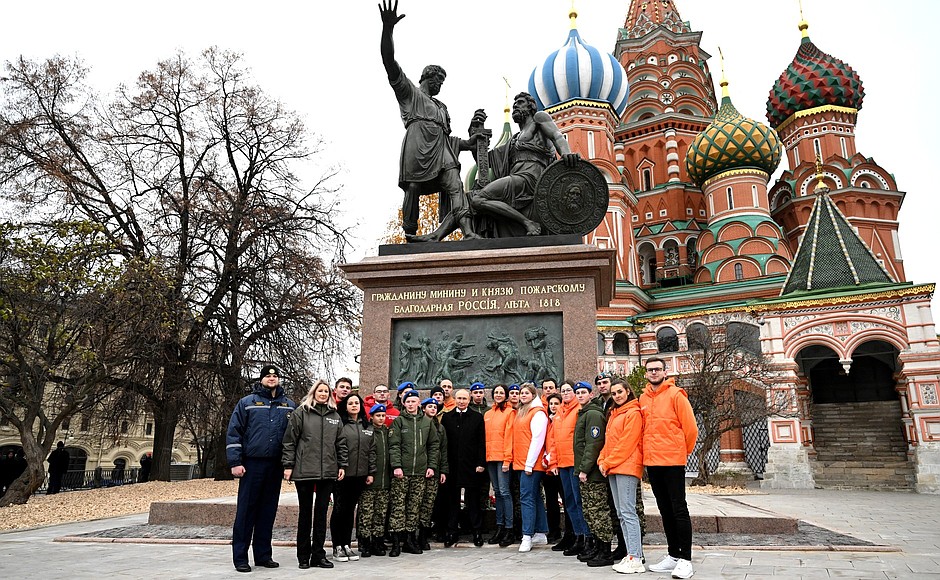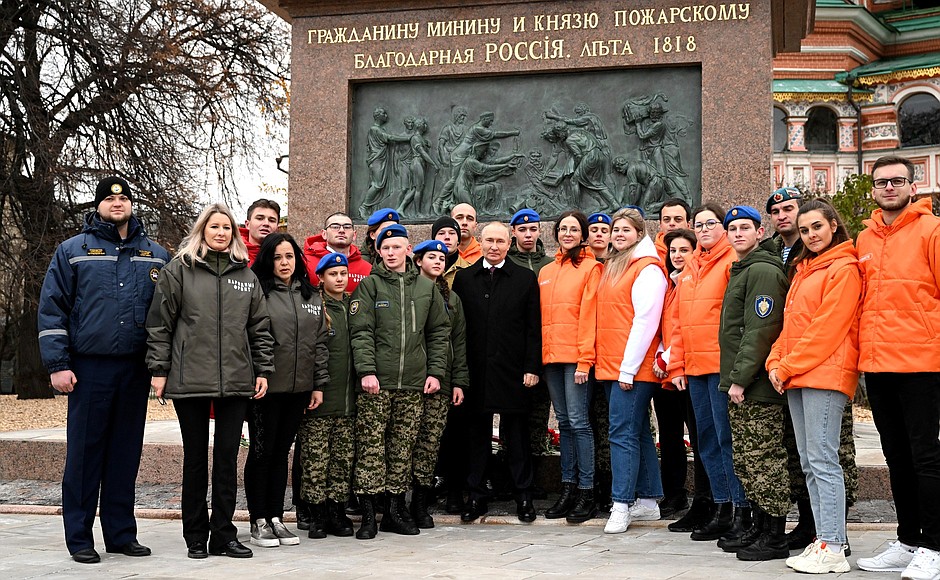Representatives of public associations, youth and volunteer organizations took part in the traditional National Unity Day ceremony on November 4. The President had a brief conversation with them.
National Unity Day was instituted in 2005 to commemorate the 1612 event, when the second people’s militia led by Kuzma Minin and Dmitry Pozharsky liberated Moscow from foreign invaders.
* * *
President of Russia Vladimir Putin: How are things? What do you do at the Popular Front?
Anzor Kardanov: Mr President, I am Anzor Kardanov, a Russian Popular Front coordinator for the youth division in the Republic of North Ossetia – Alania.
Vladimir Putin: Hello.
Anzor Kardanov: We sent humanitarian aid to remote townships under the supervision of Igor Kostyukevich [State Duma deputy] as part of the humanitarian aid shipments to the Kherson Region, and we showed good results, I think.
As I take part in this ceremony today, I am feeling the unity and closeness that we are talking about and so badly need now.
Vladimir Putin: This is true, you are right.
Anzor Kardanov: Regarding the work in the Kherson Region, I want to note that people appreciate us and thank us.
Interestingly, the locals in practically every township or village ask us to bring them Russian flags. I always try to have a certain number of flags in my car and give them to anyone who asks for them and to those who see our tri-colour as an absolute value. I think this is a very important indicator, and it is important that we are together.
Thank you.
Vladimir Putin: That is right. Thank you very much for this work.
Currently, the residents of Kherson are being evacuated from the areas with the most dangerous combat activities because civilians should not suffer from shelling and other military activity. Therefore, young people like you are doing everything possible to move the people to safe areas, and this is right.
Thank you very much.
Anzor Kardanov: Thank you.
Tatyana Nod: Mr President, I also want to address you.
My name is Tatyana Nod, I am from the city of Kharkov; I teach at an elementary school. At the beginning of the special operation, I left for the Kupyansky District. When I learned about the Popular Front I began volunteering and later opened a help center for the village of Dvurechnaya and other nearby villages. Other people helped, the Popular Front helped, everyone was connected.
Then it turned out I had to leave for the Belgorod Region.
Vladimir Putin: I understand.
Tatyana Nod: We are now in Belgorod helping refugees from the Kharkov Region. But we have a problem: many people ask us about applying for passports. Many of them want to become citizens of this country, they want to feel wanted, find a job, and make a contribution to this country. But there are some problems with the fact that they have fled – for example, with me, I left with just my passport, I thought Russia would come and I would return, and it turns out there is only one passport…
Vladimir Putin: I see, there are no other documents.
Tatyana Nod: No other documents.
They only have temporary residence registration.
Vladimir Putin: I see.
Tatyana Nod: I would like to ask you on behalf of the refugees and myself to simplify this procedure somewhat, if possible.
Vladimir Putin: Of course.
We are working on this now to avoid abuse – that is clear – so no one can use the situation you are in for personal gain.
There is no doubt that those who need help must receive it.
We are now taking decisions to provide for a simplified procedure to issue such documents, and we will be updating these mechanisms. We will definitely work on this.
I know that many people from the Kharkov Region and the city of Kharkov are trying to get to Russia, and not directly as you did but in various roundabout ways. We will do everything we can to support them and people like you.
Tatyana Nod: I am grateful to you for that.
Vladimir Putin: And what is your profession?
Tatyana Nod: Elementary school teacher.
Vladimir Putin: An elementary school teacher. You need a job, too.
Tatyana Nod: I really do. And to teach kids.
Vladimir Putin: We will definitely help you and people like you, all right?
Tatyana Nod: Thank you very much.
Nikita Ilyichov: Hello.
Vladimir Putin: Hello.
Nikita Ilyichov: My name is Nikita; I am from the Moscow Region.
We have actually been working with refugees since February 23. My team and I opened a humanitarian aid collection point in the Moscow Region. We went to temporary refugee shelters when we opened. We arranged for children and teenagers to work and helped them with leisure time, and we try to instill the correct values in them.
We also were among the first to send humanitarian aid to our servicemen. We have a military unit – the Sofrino Brigade, and we sent them postcards and crafts; it is a kind of support for the soul, an interesting approach. The men on the frontline needed it, and we had incredible feedback. So, we did that a number of times.
Speaking about the Moscow Region, I can say that young people are enthusiastic, they are ready to work in the best possible way. We do patriotic work and proper upbringing. So, you can rely on us, Mr President.
Vladimir Putin: I do rely on people like you.
Alexei Petrykin: And on us too, Mr President.
Vladimir Putin: Just feel the difference between those from Ukraine who came to us and those who are in Europe: over there they walk around restaurants and demand discounts while the people here are striving to work.
(Laughter.)
Nikita Ilyichov: Yes. We are ready to help.
Vladimir Putin: That is how it is.
Go ahead, please.
Alexei Petrykin: Mr President, the Vympel military patriotic centre represents children from across Russia.
I am from Oryol, and I work as chairman of the Oryol Region DOSAAF [Voluntary Society for Assistance to the Army, Air Force, and Navy].
Just give us an assignment and we will fulfil it.
Vladimir Putin: There are assignments, and you know them, and you are already pursuing them as you work with kids, with girls and boys.
Alexei Petrykin: Thank you, Mr President.
Kristina Izbitskaya: Mr President, we, the people in red vests, represent the national movement We Are Together.
For several years we have been providing help to those who badly need it. We got united during the pandemic, we got closer together again in February and were helping evacuees, and now we are working with servicemen’s families.
My name is Kristina, I am from an atomic city, it is small but very cool. This summer I took a holiday and went to Lugansk without telling anyone except my son, to manage a humanitarian mission.
My team and I managed to hold over 50 workshops for around 200 children from orphanages within those three months. We engaged the groups who happened to be there for this work – the Lugansk office of the Volunteer Medics, sappers from Emergency Ministry’s Leader group. A Doctor of Economics was in contact with us, he had online classes of financial literacy for orphanage kids.
You know, we have already organised 91 humanitarian missions, and there will be more. What the young people are doing is just a miracle. I would like to introduce one of the magicians – Artyom from the Russian Student Construction Brigades.
Vladimir Putin: Just a second.
Let us first remember another magician. What is your son’s name?
Kristina Izbitskaya: Innokenty.
Vladimir Putin: How old is he?
Kristina Izbitskaya: He is nearly 18.
Vladimir Putin: He is a big lad, actually.
Kristina Izbitskaya: Meanwhile, my mother thinks I am in Donetsk now. (Laughter.)
She cannot believe that I am here.
Vladimir Putin: Where do you live, what city?
Kristina Izbitskaya: Novouralsk in the Sverdlovsk Region, an atomic city.
Vladimir Putin: I see.
Innokenty will probably see us.
Kristina Izbitskaya: I hope so.
Vladimir Putin: Let us turn around and say hi to him.
Kristina Izbitskaya: Can I also give regards to my mom?
Vladimir Putin: What is your mother’s name?
Kristina Izbitskaya: Anna.
Vladimir Putin: Anna, thank you for your daughter and for your grandson.
Kristina Izbitskaya: Mother, I am not in Donetsk, I am really in Moscow. (Laughter.)
Vladimir Putin: Go ahead.
Artyom Konkov: Mr President, I am a representative of Russian Student Brigades and the head of the Sputnik construction team. This summer, I took part in the work to restore the Saur-Mogila memorial complex [in the Donetsk People’s Republic], a local landmark.
Vladimir Putin: How long did you work there?
Artyom Konkov: We worked there for two months together with the Defence Ministry’s military construction company.
Vladimir Putin: The complex turned out to be magnificent.
Artyom Konkov: Yes, I liked it very much as well. We worked there between July 8 and September 8.
This was my first labour mission, which I will remember all my life.
Should such an opportunity arise, I am already planning to travel to Donbass with my team once again as part of a construction and humanitarian mission to restore not only the monuments but also residential buildings. I have visited Mariupol and saw the city myself. If we have the opportunity, our team as well as many members of the Russian Student Brigades are ready to travel to Donbass to engage in restoration work, provide assistance to local civilians and, of course, to prove that we are all together.
Vladimir Putin: First, this is a very good slogan, “We Are Together.”
Second, we have another popular motto, “No One Is Left Behind.” And what you are doing is simply the best evidence of it being not mere words but actual efforts.
As for Mariupol, Donbass, Donetsk – Mariupol is a very well-known, ancient and, one can say, Russian city. As you know, Peter the Great founded his first warship flotilla and won his first battles there. Later, Alexander Suvorov carried out his steppe campaigns there, and Catherine II built up those lands. It is a place with a fascinating history, and there is much to work on.
Obviously, the people there have suffered a great deal and their homes have been damaged. Yesterday at around midnight, my colleagues and I discussed the rehabilitation of the territories of Donbass and Mariupol, which sustained great damage. We must restore housing, social infrastructure, kindergartens, libraries, theatres, museums and other facilities there.
Today we are celebrating National Unity Day, and these cultural artefacts, which only confirm the entire course of historical events that took place in that land and happened to its people, are very important for those who lived for three decades amid crazy, absolutely outrageous nationalist propaganda to get the understanding of where they come from. Actually, the events that took place there only suggest that they are aware of this. But it is also important for young people who grew up under this outrageous Banderite propaganda to understand that their stance today is absolutely right and justified, and based on their ancestors’ historical traditions. This is simply essential.
This is a landmark memorial complex, there is much to work on, and this will be relevant. Of course, we will consider this.
Artyom Konkov: Thank you very much.
Tatiana Adushkina: Mr President, my name is Tatiana, and I represent the Mosvolontyor (Moscow Volunteer) Resource Centre.
Vladimir Putin: What is a resource centre?
Tatiana Adushkina: It is a large centre that unites all volunteer movements in Moscow.
Our team coordinates the work of 14 humanitarian aid stations in Moscow. Since February, we have collected over 2.5 million items, such as food and personal care products, as well as books, toys and school kits.
Also, just recently, we donated 400 musical instruments to gifted children in the Donetsk People’s Republic.
As you have rightly noted, we need to restore library stocks and provide books for schools. We have donated more than 7,000 books for libraries and schools.
Since September 21, the families of our mobilised citizens have been approaching us for humanitarian aid. We have provided assistance to over 500 families. They are asking for humanitarian aid, and we have collected school and children’s kits, stationery, animal food, and much more.
I would like to note that these stations involved in providing assistance to mobilised citizens’ families are open and operate all across the country.
Vladimir Putin: Just recently, the day before yesterday, I met with governors of southern regions and mentioned that providing help to the families of our mobilised servicemen is a sacred duty for the authorities at all levels. But it is particularly valuable that such young, beautiful, talented and motivated people like you get involved in these efforts: this means that someone is doing it not by force of duty but by choice to help the families of those who have been mobilised.
Obviously, this work should be conducted closely with local authorities. Do not hesitate to approach them directly to get them engaged in these efforts. It is highly important – probably among the most important areas of work today.
Thank you very much.
Tatiana Adushkina: Thank you for your support, particularly for the support for our project We Are Together.
Vladimir Putin: Also, we already have 318,000 people mobilised, the planned call-up number being 300,000. This is because volunteers keep arriving, and their number is not decreasing.
Of these, as far as I remember, 49,000 are already in the troops and performing combat missions. The rest are undergoing training so far. Still, this is a huge number of people. And they have families – mothers, fathers, children and wives. Of course, the government makes every effort to support them, but when done by choice it is the most important, reliable and efficient assistance.
Thank you very much.
Tatiana Adushkina: Thank you, Mr President.
Andrei Potalitsin: Hello, Mr President. I am Andrei Potalitsin and I represent the All-Russian Student Rescue Corps. I should note that volunteer rescuers have managed to restore temporary accommodation stations, administration buildings, schools and sports grounds in the liberated territories. They are also involved in repairing the shell, core and utilities of residential buildings. This past summer, volunteer rescuers unveiled a monument to soldiers-internationalists in the town of Volnovakha. And another interesting fact: volunteer rescuers have also installed a bell in a church in the Donetsk People’s Republic.
Vladimir Putin: Was the bell cast somewhere in Russia?
Andrei Potalitsin: Yes, it was.
The main task of volunteer rescuers is obviously delivering humanitarian assistance to those who need it. So, our volunteers take consistent efforts in accompanying convoys together with the Russian Emergencies Ministry to deliver water and food.
I took part in these efforts for two weeks, including in a humanitarian mission in the town of Shchastye and emergency recovery work in the Lugansk People’s Republic.
Vladimir Putin: You are working closely with military personnel and the Emergencies Ministry. You should observe precautions as this work is not safe.
Andrei Potalitsin: All volunteers have received training at volunteer resource centres.
Vladimir Putin: Great, good job.
Andrei Potalitsin: Thank you.
Vladimir Putin: Happy National Unity Day to you, guys!
